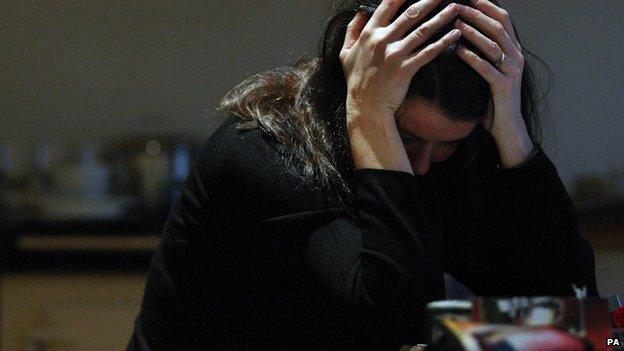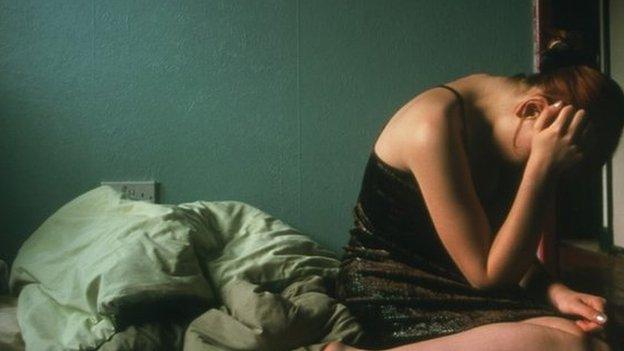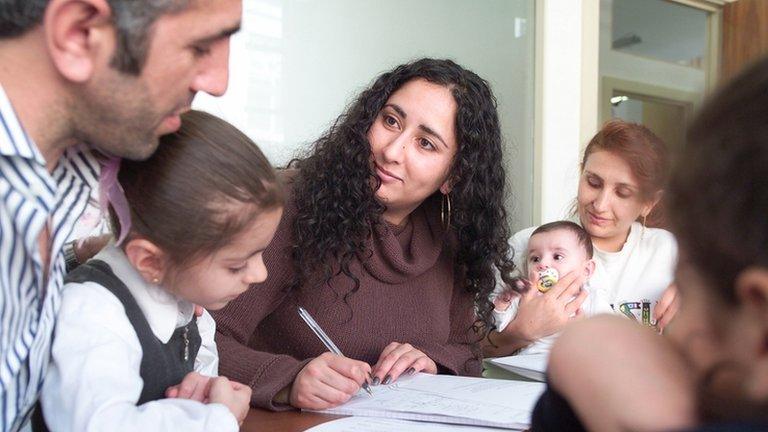A third of domestic abuse victims 'cannot get legal aid'
- Published

Those who can provide evidence of domestic violence in the last two years are eligible for legal aid
More than a third of domestic violence victims cannot provide evidence to get legal aid, MPs have warned.
The Justice Select Committee said without support from a lawyer, victims found it difficult to leave abusive partners and were open to intimidation.
Its report, external criticised the government's legal aid changes and said they had "harmed access to justice" for some.
The Ministry of Justice said legal aid is available where it is needed and the reforms were kept "under close review".
The Legal Aid, Sentencing and Punishment of Offenders Act 2012 (Laspo) removed legal aid from private family law, but those who can provide evidence of domestic violence are still eligible.
This evidence must be from no more than two years ago.
The committee heard that this requirement "presented problems for victims", as a court case could happen long after a relationship breakdown.
Clare Laxton, public policy officer at charity Women's Aid, told the committee that some of the most common forms of domestic abuse, including emotional and psychological abuse, are difficult to evidence.
'Barriers to justice'
The committee said the Ministry of Justice had failed in three of its four objectives for Laspo.
There had been a "significant rise" in litigants in person, the Ministry of Justice had "failed to target legal aid" to those who need it most, and it had failed to prove that it was better overall value for money, the report said - although savings had been made.
Recommendations from the committee included better information from the government on eligibility for legal aid.
Committee chairman Sir Alan Beith said while the Ministry of Justice had successfully made savings, this had "limited access to justice for some of those who need legal aid the most".
He said it was "vitally important" the Ministry of Justice remedied this.
Jenny Beck, co-chairwoman of the Legal Aid Practitioners Group, said that it was difficult for people in crisis to obtain legal advice because of "unnecessary bureaucratic hurdles".
"The cuts to the legal aid system have resulted in barriers to justice for ordinary people," she said.
Gillian Guy, chief executive of Citizens Advice, said abuse victims face "overwhelming challenges" because of restrictions on legal aid.
"It is unacceptable that victims are left to shoulder the burden of obtaining evidence in order to protect their children or separate from their abuser," she said.
"Paying legal aid contributions or meeting evidence requirements that mainly focus on physical abuse create extra barriers to justice for victims of financial abuse."
A Ministry of Justice spokesman said legal aid was a "vital part" of the justice system.
"We protected civil legal aid so it remains available where legal help and advice is most needed," he said.
"It is entirely untrue to allege people who are eligible for legal aid under Laspo did not get it.
"We are keeping these reforms under close review and have already made changes to address issues raised.
"We are also undertaking a comprehensive research programme to better understand why people choose to go court and how they deal with legal problems."
- Published18 December 2014

- Published20 March 2013
